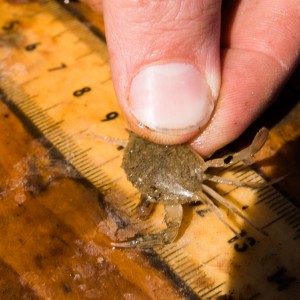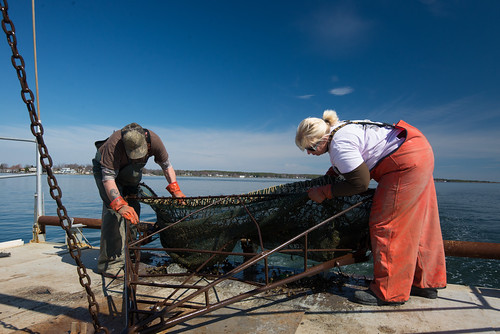Spawning-Age Female Number Nearly Doubles
 The Maryland Department of Natural Resources today released the results of the 2016 Blue Crab Winter Dredge Survey, which show another year of growth in the stock of the Chesapeake Bay crab population and bodes well for a better harvest this year. The survey indicates a bay-wide crab population of 553 million, a 35-percent increase over last year. This is the fourth highest level in two decades, and builds on last year’s 38-percent boost in abundance.
The Maryland Department of Natural Resources today released the results of the 2016 Blue Crab Winter Dredge Survey, which show another year of growth in the stock of the Chesapeake Bay crab population and bodes well for a better harvest this year. The survey indicates a bay-wide crab population of 553 million, a 35-percent increase over last year. This is the fourth highest level in two decades, and builds on last year’s 38-percent boost in abundance.“Due to a milder winter, favorable currents and tides, and wise bay-wide management measures, the Maryland crab population continues to rebound and strengthen,” Fisheries Service Director Dave Blazer said. “With an increase in abundance and steady recruitment, we fully anticipate a robust crab season this year.”
Improvements were seen in all age groups of male and female crabs. The spawning female stock nearly doubled from 101 to 194 million and the adult male stock more than doubled from 44 to 91 million – the second highest levels since 1995.
The number of spawning-age female crabs remains below the 215 million target but above the minimum threshold established in 2011. The juvenile crab abundance increased slightly from 269 million to 271 million, which is just above the 27-year average.
“The highly variable nature of the blue crab population means that we must maintain a degree of caution in considering management adjustments,” Chesapeake Bay Stock Assessment Committee Chairman Glenn Davis said.
 The 2015 bay-wide crab harvest increased by 42 percent over 2014 to 50 million pounds and remained at sustainable levels for the eighth consecutive year. This combined with increased abundance means that a slight liberalization of harvest limits for female crabs may be warranted this summer.
The 2015 bay-wide crab harvest increased by 42 percent over 2014 to 50 million pounds and remained at sustainable levels for the eighth consecutive year. This combined with increased abundance means that a slight liberalization of harvest limits for female crabs may be warranted this summer.“Our experts will now discuss the survey results with our internal and external stakeholders,” Blazer said. “Any modest adjustment to the current regulations, be it season length or bushel limit, will be considered only after the department receives input from all parties.”
The Chesapeake Bay Stock Assessment Committee plans to release a full analysis this summer.
The annual Winter Dredge Survey, conducted by the Maryland Department of Natural Resources and Virginia Institute of Marine Science since 1990, is the primary assessment of the Chesapeake Bay’s blue crab population. In the survey, biologists use dredge equipment to capture, measure, record and release blue crabs at 1,500 sites throughout the bay from December through March. Crabs tend to bury in the mud over the cold winter months, which makes it possible for scientists to develop accurate estimates of the number of crabs.

Cute. A way little bit of a crab. Looks like it would make a cute pet.
ReplyDeletewish we could ban crabbing for a couple of years to get the population back up. We currently subsidize farmers for bad crop years so why not watermen. The only down side for the watermen is now they would have to pay taxes on the money they get where most are in a cash business now.
ReplyDeleteDoes anyone know where to get good steamed crabs that are done fresh and not reheated after being steamed in the morning? Or is the place all the way down in Pocomoke the only one?
ReplyDeletedt had excellent column on this today
ReplyDeleteI'll catch my own this year, it's beats being ripped off by the Roost and that pig manager.
ReplyDeleteskipjacks and fatboyz will be ebt eager
ReplyDeleteI heard she quit and is now a realtor.
ReplyDeleteThere are a few place, but i'll never tell lest they be ruined by the masses.
ReplyDeleteWrite this down, folks! First, there's this, which will bring prices down for starters, then you will see reports of "low harvest" the bump prices. Then you will hear things are okay again, after the market stops because of a glut of crabs because of the last hype, and prices will have to drop again, or crabs rot.
ReplyDeleteI should write the Crabber's Almanac every year, because it repeats itself all the time!
It's all about raping the tourists.Go figure!
Buy accordingly.
Freshly steamed crabs can be had any time you want! Just buy them live and a can of old bay. You'll need a 2+ gallon pot and your own stove with a burner on top, though. Oh, and just add a little water first!
ReplyDeleteI'm thinking the first two factors are more responsible than the last one mentioned.
ReplyDeleteNo She still runs the kitchen I saw her last weekend.
ReplyDeleteBest deal for crabs is Fat boys, eat at home and don't have to go to skeeterville.
ReplyDeleteMust have been a different manager....
ReplyDeleteThey're rude whoever they are.
ReplyDeleteI went there last week and was served empty crab legs.
ReplyDeleteThe redheaded one quit and is a "realtor" now. There is a career path. The real estate market is booming in the area. LOL.
ReplyDeleteGot crab legs from Fat Daddy's and they had meat in them yeah !
ReplyDelete